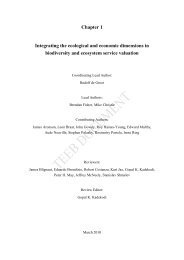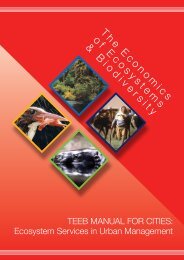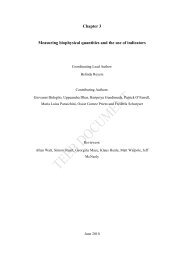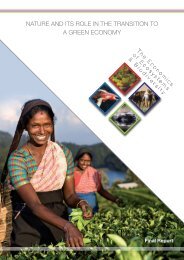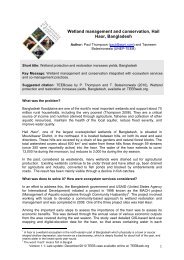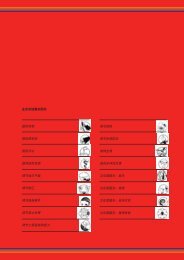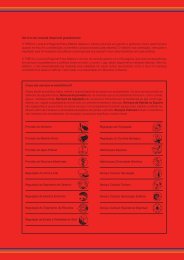Download (PDF, 6.71MB) - TEEB
Download (PDF, 6.71MB) - TEEB
Download (PDF, 6.71MB) - TEEB
You also want an ePaper? Increase the reach of your titles
YUMPU automatically turns print PDFs into web optimized ePapers that Google loves.
6.5<br />
Over the last two decades, we have come to understand<br />
the scale of subsidies in different sectors, the<br />
extent and mechanics of their environmentally harmful<br />
effects and how cost-effective they are (or not) in achieving<br />
their goals. Some progress has been made in<br />
removing and/or reforming subsidies but with few exceptions,<br />
the progress is piecemeal and fragmented.<br />
Globally, subsidy reform is unfinished business.<br />
Persistent myths surround subsidies and their reform<br />
and can block change. Many of these myths can and<br />
should be debunked:<br />
• Claim: subsidy reform will harm competitiveness.<br />
Keeping subsidies is bad for a sector’s longterm<br />
competitiveness as it becomes dependent on<br />
subsidy and this puts strains on public finances.<br />
• Claim: subsidy reform will result in job losses.<br />
In the short-term, this can be the case for the<br />
specific sector. However, compensatory measures<br />
can address some adverse impacts and incentives<br />
can be put in place to attract investment.<br />
There are also possible employment gains from<br />
use of monies elsewhere: the actual net effect<br />
depends on relative labour intensities of the<br />
activity replaced compared to the new activity.<br />
In the long term, increased competitiveness via<br />
innovation (e.g. energy efficiency) or increased<br />
availability of resources (e.g. fish) should help<br />
support or create jobs.<br />
• Claim: subsidy reform will have negative<br />
implications for social equity. This claim is often<br />
made about energy subsidies yet poorer households<br />
spend less on energy than middle income<br />
households. Yet there are more targeted and<br />
effective ways of helping the poor than subsidies<br />
that tend to benefit all users.<br />
REFORMING SUBSIDIES<br />
TARGETING SUBSIDY REFORM<br />
AT TOMORROW’S PRIORITIES<br />
• Claim: subsidy reform will lead to a loss of<br />
livelihoods e.g. for poor farmers and fishermen.<br />
Empirical studies show that many existing<br />
subsidy programmes are not well-targeted at<br />
social objectives: even if the poor draw some<br />
benefit, most of it goes to the relatively rich.<br />
• Claim: many people do not wish to change<br />
their livelihood (e.g. from fishing or mining).<br />
In some cases, this is indeed true but in others<br />
there is interest in other forms of employment.<br />
Acceptability is linked to options for employment<br />
substitution.<br />
• Claim: reforming environmentally harmful<br />
subsidies is almost impossible because of<br />
vested interests. In reality, the picture is mixed.<br />
Evidence shows that reforming subsidies is<br />
possible and that negative effects on the economic<br />
and social system can be reduced or<br />
compensated or else be borne by people within<br />
acceptable limits.<br />
• Claim: subsidies are good for the environment.<br />
Financial transfers that are well-targeted at<br />
environmental objectives and cost-effective can<br />
play an important role in improving incentives for<br />
conservation of ecosystems and biodiversity (see<br />
Chapter 5). Yet many existing subsidies are environmentally<br />
harmful: their prior or simultaneous<br />
removal or reform will improve the cost-effectiveness<br />
of environmental incentive payments.<br />
Moreover, even ‘green’ subsidies may not be<br />
well-targeted and/or not be cost-effective.<br />
Adjusting them for better performance will<br />
ultimately make their case stronger.<br />
<strong>TEEB</strong> FOR NATIONAL AND INTERNATIONAL POLICY MAKERS - CHAPTER 6: PAGE 33



